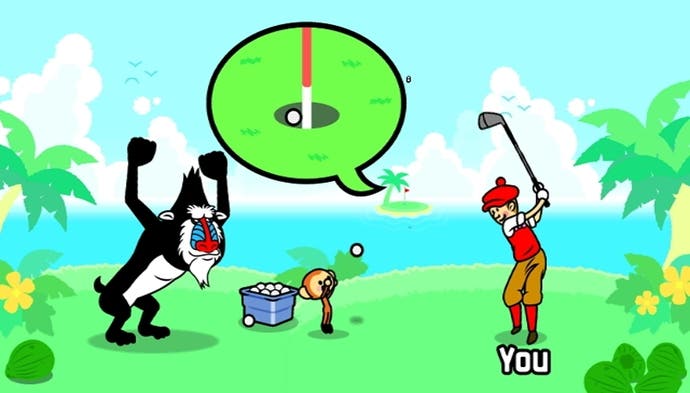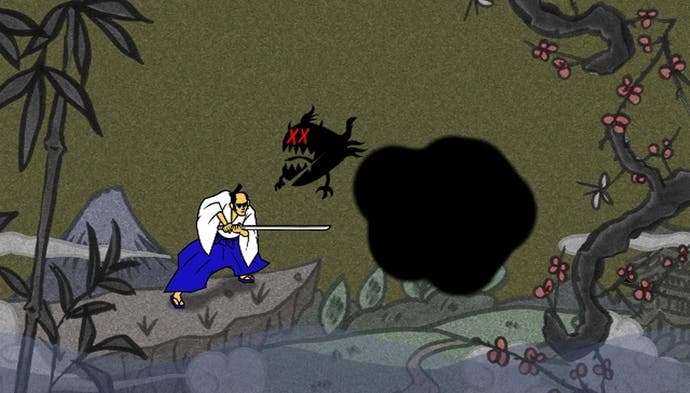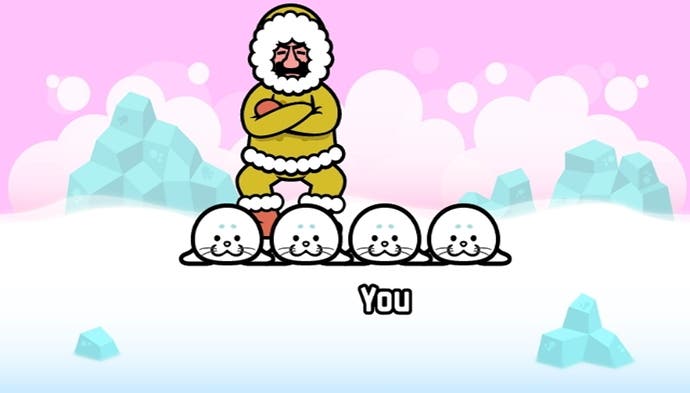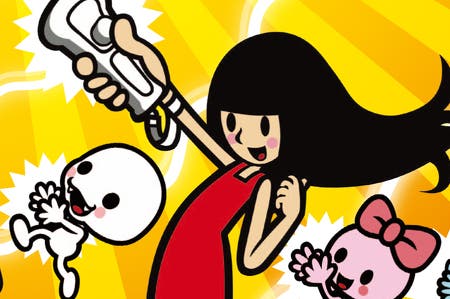Beat the Beat: Rhythm Paradise Review
To the beat of a different drum.
Did Nintendo's Wii drown under the weight of its mini-games? If that's true, then the unwitting architect of its destruction was Yoshio Sakamoto, creator of the Metroid series and Nintendo's Dark Mario to the primary-coloured innocence of its better-known star designer, Shigeru Miyamoto.
It was his game, WarioWare Inc. - a rudely creative reduction of the medium's core mechanics to first-principle micro-games, each one five seconds long and with a single word of barked instruction - that kicked up a tidal wave of me-too imitators. No platform attracted so many mini-game collections as Nintendo's Wii, a trend that became an identity, became a fate: shallow, disposable.
Fitting, then that a Sakamoto-produced mini-game collection should mark the end of this console's life, as the Wii makes way for its successor later this year. But Beat the Beat: Rhythm Paradise is no weary swansong. If the mini-game collection has become synonymous with the insubstantial, then Rhythm Paradise very much plays to the beat of its own drum. Its parade of diverse musical stages may have the wild-eyed flippancy one might expect from the offbeat creators of WarioWare, but beneath the lunacy is an unforgiving rhythm action game.

It also eschews motion control. You interact with Rhythm Paradise almost exclusively by tapping the A button, with just the occasional squeeze of the trigger to add variety. This binary interaction is short, sharp and precise.
Make no mistake: Rhythm Paradise is a game that demands precision. It might have you thwacking shuttlecocks above the clouds as a badminton-playing, biplane-piloting dog, or screwing the heads on love-bots in a cavernous factory, or slicing through legions of ghouls as an Edo-era samurai searching for his lost pinwheel. But it's also a game built upon the hard mathematics of pulse and tempo.
This core is revealed in your first encounter, where a metronome taps out a beat and asks you to stab the A-button at the end of the bar. An on-screen indicator shows you, to the nearest 32nd, your rhythmic accuracy over a series of taps: cold, hard evidence of where the weaknesses lie in your rhythmic ability.
It's the only time in the entire experience that the creators pull back the curtain for a glimpse of what's going on behind the mini-game scenarios. But it acts as a kind of thrown gauntlet. You think this is a game for children? Perhaps. But beneath the silly animations, the fundamentals of rhythm and maths stand, arms crossed, judging your every tap.

But at the surface level? Oh, the whimsy.
The launch of Rock Band 3 in 2010 is widely considered The Day the Music Game Died. It wasn't down to the quality of Harmonix's magnum opus, which was in so many ways the prefect expression of the rock-'em-up - part multi-instrumental karaoke machine, part music tutor. Nevertheless, almost overnight plastic sets of drums and guitars slipped from store shelves and the tour bus parade of Guitar Hero sequels and its me-too cover bands went home, contracts in tatters. Those few music games to take their chances in its wake have needed to take a less literal route. So it is with Rhythm Paradise.
Gone are Guitar Hero's vertical musical staves. In Sakamoto's game, musical notation is an art asset to be played with, subverted, made fun of. In one throwaway micro-game, you control a stick man, Mr Upbeat, who must jump over the swiping point of a metronome as it swings back and forth. This is perhaps the most overt musical visual metaphor used in the game. Elsewhere, you must bat away footballs as they bounce towards you in time to a chip-hop backing track, in order to protect your unwitting date from being struck by the incoming projectiles.
In another mini-game, you assume the role of a professional wrestler being interviewed by a waif-like reporter. Her incomprehensible questions rattle along in a call-response manner, and you tap the button to deliver a monosyllabic response at the end of the phrase. To add variety, every now and again you must interrupt the interview to pose for the assembled paparazzi. In another, you play as a microbe who, along with his microbe friends, wants to put on a good performance for the scientist who has spotted them in the eye of his microscope.
"It might have you thwacking shuttlecocks above the clouds as a badminton-playing, biplane-piloting dog, or screwing the heads on love-bots in a cavernous factory, or slicing through legions of ghouls as an Edo-era samurai searching for his lost pinwheel."
Sakamoto and his team's brilliance is to be found in both the ideas and their execution. Almost every mini-game is spread thick with humour and eccentricity, leading to laugh-out-loud moments. Here, the variety is a strength. While the core mechanic is almost always the same (tap button in time with music for high score), the dressing zips from scenario to absurd scenario, a machine-gun volley of amusement and wild silliness.
In time, though, familiarity robs each stage of its initial impact and all that remains is Rhythm Paradise's tall challenge. You play a series of mini-games in order before being challenged to a Medley, which mixes the preceding stages up into a longer track. These offer the most challenging moments in the game and you must scape a pass before the next set of levels opens up, leading to a few bottlenecks of progression.

Earn the highest ranking on a stage and, at random moments, you'll get the chance to attempt a perfect run on a particular stage. You have three chances to 'perfect' the stage before the opportunity vanishes again - these play-throughs offering the most intense and stressful moments in the game.
The lack of an instant 'retry' option grates here, as does the fact that the tutorial for each mini-game plays out every time you reattempt (even if it is possible to skip it). As a result, the structure feels just a little too rogue-ish and stifling, and the options just a little undernourished. Likewise, the simplistic multiplayer component - eight variations on single-player micro-games - seems like an afterthought.
But what elevates Rhythm Paradise is that, as in WarioWare, almost every mini-game enjoys a sense of unbridled creativity, a Bishi Bash Special-style Japanese kookiness tempered by solid rhythm action foundations. It's playful, subversive, irreverent and, at times, impudent, revealing a darker, more left-field side to Nintendo that increasingly stays hidden. Let it out, we say. Let it out.

